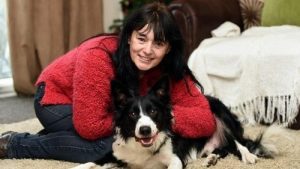The Dog that Detected its Owner's Breast Cancer

Over the past few years, dogs have started to be utilized for a variety of new tasks, some of which may surprise you. They’ve been used to detect diseases like cancer, diabetes, and many others. Today, we’ll share the incredible tale of a dog that saved its owner’s life by detecting a cancerous tumor in her breast, before the owner even had any inkling that she was sick.
We’ve always known that we have plenty to thank our pets for – but we may well not have thought that one day we’d be thanking them for the fact that we’re alive at all. So keep reading, and learn some surprising facts about the lifesaving instincts and incredible love that our pets can offer us.
The dog that detected its owner’s breast cancer
Karin Gibson is a 62-year-old with a beautiful black Labrador whom she cherishes – but she never imagined that one day it would end up saving her life. The curious story began to unfold when they were on vacation together, and Karin noticed that the dog was acting strangely.
He was all over her, and would not stop compulsively sniffing her body. What’s more, he kept on touching one of her breasts with his paws.
Karin says that, while she and her dog Paddy have always had an affectionate relationship, his behavior at this point was too much for her. He was jumping all over her, smelling her, staring at her intently and pawing at her breast.
His behavior began to ring alarm bells with Karin, and she wasted no time in getting a medical check-up. Imagine her surprise when the doctor detected a cancerous tumor in her breast. The very same one that Paddy had been compulsively pawing! Thanks to Paddy and his infallible nose, the tumor was detected in time, and could be swiftly operated on.
This grateful owner could never have imagined how much she would have to thank her beautiful Labrador for.
This is far from an isolated case. There are many other examples of dogs successfully detecting various types of cancer in their owners. Let’s check out a few of them:
Some other fabulous cancer-detecting canines

- Max. This puppy was able to detect cancer in his owner even when a clinical test had come back was negative. Going against the test results, this plucky animal wouldn’t take no for an answer. Eventually, the test was repeated, and physicians discovered the tumor, which was operated on successfully.
- Marine. This dog, trained in Japan, achieved 90% success rates in detecting cancer.
- Ledy. This little dog one day began to smell her owner’s neck and touch it repeatedly in the same place. When the owner went to get a medical check-up, doctors duly discovered that she had a cancerous tumor.
These are just some cases of pets that have successfully detected cancer. But how on earth are they able to do it? Let’s check it out.
How can dogs detect cancer?
A number of studies show that dogs have the ability to detect cancer by smell. In one study, hundreds of dogs carried out their training in different laboratories, and then all underwent the same tests. They smelled healthy participants, and then others who had already been diagnosed with cancer – and the dogs all reacted in the same way.
This is because tumors give off an almost imperceptible smell, albeit one that the sensitive noses of dogs are able to sniff out. The smell tests were carried out using the breath and feces of the ill patients, with the dogs achieving 98% cancer detection success rates when smelling the humans’ breath, and 95% when exposed to their feces. What an astonishing scientific breakthrough!
Scientists now say that, although it is impractical to use dogs to detect cancer, the way they use their sense of smell to sniff out the disease could be used to help develop a new sensor that will detect the most aggressive types of cancer before they are able to spread to other parts of the body.
Regardless, there’s no doubt that stories like that of Paddy and Karin spread like wildfire on social media, and you’re sure to hear more of them. And remember, the fact that dogs can detect cancer, and are in fact incredibly effective in doing so, is scientifically-proven!
Main image source: www.abc.es
Over the past few years, dogs have started to be utilized for a variety of new tasks, some of which may surprise you. They’ve been used to detect diseases like cancer, diabetes, and many others. Today, we’ll share the incredible tale of a dog that saved its owner’s life by detecting a cancerous tumor in her breast, before the owner even had any inkling that she was sick.
We’ve always known that we have plenty to thank our pets for – but we may well not have thought that one day we’d be thanking them for the fact that we’re alive at all. So keep reading, and learn some surprising facts about the lifesaving instincts and incredible love that our pets can offer us.
The dog that detected its owner’s breast cancer
Karin Gibson is a 62-year-old with a beautiful black Labrador whom she cherishes – but she never imagined that one day it would end up saving her life. The curious story began to unfold when they were on vacation together, and Karin noticed that the dog was acting strangely.
He was all over her, and would not stop compulsively sniffing her body. What’s more, he kept on touching one of her breasts with his paws.
Karin says that, while she and her dog Paddy have always had an affectionate relationship, his behavior at this point was too much for her. He was jumping all over her, smelling her, staring at her intently and pawing at her breast.
His behavior began to ring alarm bells with Karin, and she wasted no time in getting a medical check-up. Imagine her surprise when the doctor detected a cancerous tumor in her breast. The very same one that Paddy had been compulsively pawing! Thanks to Paddy and his infallible nose, the tumor was detected in time, and could be swiftly operated on.
This grateful owner could never have imagined how much she would have to thank her beautiful Labrador for.
This is far from an isolated case. There are many other examples of dogs successfully detecting various types of cancer in their owners. Let’s check out a few of them:
Some other fabulous cancer-detecting canines

- Max. This puppy was able to detect cancer in his owner even when a clinical test had come back was negative. Going against the test results, this plucky animal wouldn’t take no for an answer. Eventually, the test was repeated, and physicians discovered the tumor, which was operated on successfully.
- Marine. This dog, trained in Japan, achieved 90% success rates in detecting cancer.
- Ledy. This little dog one day began to smell her owner’s neck and touch it repeatedly in the same place. When the owner went to get a medical check-up, doctors duly discovered that she had a cancerous tumor.
These are just some cases of pets that have successfully detected cancer. But how on earth are they able to do it? Let’s check it out.
How can dogs detect cancer?
A number of studies show that dogs have the ability to detect cancer by smell. In one study, hundreds of dogs carried out their training in different laboratories, and then all underwent the same tests. They smelled healthy participants, and then others who had already been diagnosed with cancer – and the dogs all reacted in the same way.
This is because tumors give off an almost imperceptible smell, albeit one that the sensitive noses of dogs are able to sniff out. The smell tests were carried out using the breath and feces of the ill patients, with the dogs achieving 98% cancer detection success rates when smelling the humans’ breath, and 95% when exposed to their feces. What an astonishing scientific breakthrough!
Scientists now say that, although it is impractical to use dogs to detect cancer, the way they use their sense of smell to sniff out the disease could be used to help develop a new sensor that will detect the most aggressive types of cancer before they are able to spread to other parts of the body.
Regardless, there’s no doubt that stories like that of Paddy and Karin spread like wildfire on social media, and you’re sure to hear more of them. And remember, the fact that dogs can detect cancer, and are in fact incredibly effective in doing so, is scientifically-proven!
Main image source: www.abc.es
This text is provided for informational purposes only and does not replace consultation with a professional. If in doubt, consult your specialist.








